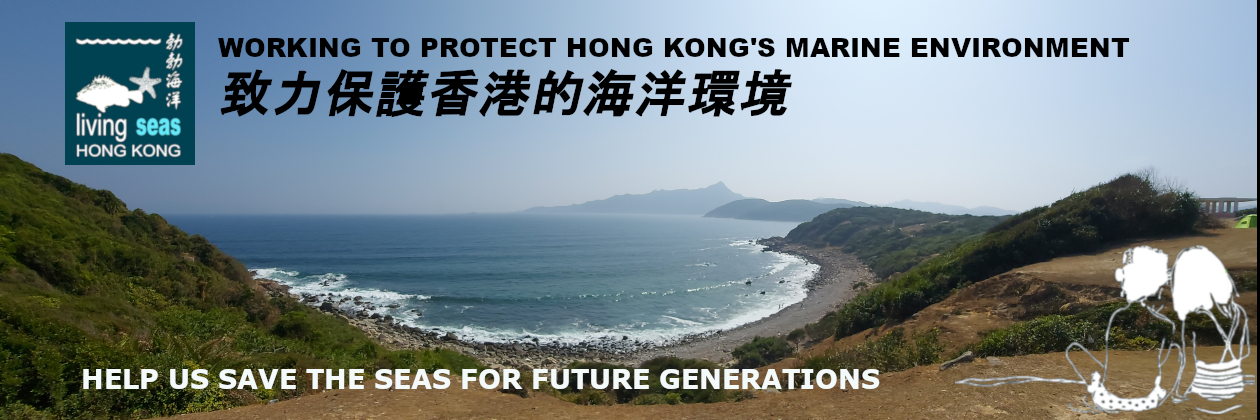The following was released and sent out to a wide group of international conservation groups and international media
JUVENILE WHALE SHARK (RHINCODON TYPUS) KILLED IN HONG KONG WATERS
(HONG KONG 1st July 2008), 06TH June 2008, a 6m juvenile whale shark became entangled in a stern trawler’s net, just of South Hong Kong Island. Fishermen dragged the whale shark back to Aberdeen Harbour and left it whilst they negotiated a financial settlement. After some 5-6 hrs it was released after a hawker paid HK$20,000 to set it free. The whale shark was later found dead floating up side down having presumably died from suffocation and toxic poisoning. It was dumped in Tseung Kwan O landfill.
The whale shark, Rhincodon typus, is a slow filter feeding shark that is the largest living fish species. Though uncommon in Hong Kong’s territorial waters, whale sharks are often seen and tracked in waters just to the South and East of Hong Kong and are frequently seen in nearby Mainland China.
Regionally the whale shark is protected* in the Philippines, Thailand, Australia and even Taiwan (having noticed massive declines in abundance), will reduce its catch quota to 30 individuals in 2008, down from 60**
This wasteful killing of a protected species has highlighted major gaps in Hong Kong’s legislation towards protection of any marine species and more significantly the lack of action from the authorities to act upon an internationally protected CITES species is alarming and exposes Hong Kong’s despotic conduct regarding international conservation laws.
Hong Kong has implemented legislation to cover trade under CITES regulations but this is designed for commercial transactions and does not protect any CITES species caught in Hong Kong waters. Significantly Hong Kong’s ‘Wild Animals Ordinance’ designed specifically to protect endangered animals SPECIFICALLY excludes all fish and marine invertebrates. These gaps in Hong Kong’s current legislation need to be filled and are in sharp contrast to legislation implemented in other countries in the region.
David O’Dwyer, Living Seas Hong Kong chairman said “I have been on an emotional roller coaster, from excitement to hear that a whale shark was found in Hong Kong waters, to great distress on hearing of his death and then extreme surprise and outrage when I investigated and found that in Hong Kong there was no protection for an internationally revered and internationally protected species. The Hong Kong government urgently needs to redraft legislation and ensure that all fishermen and accountable officials are fully aware of their responsibilities. This situation cannot be allowed to happen again.”
Mr. Charles Frew, Managing Director of Asiatic Marine Limited, Asia’s leading shark diving specialists was quoted as saying “The whale shark is a truly global resource. It belongs to all of us. I therefore urge the Hong Kong Government to prohibit the killing and landing of whale sharks in Hong Kong and to send a message to China as well to further enact legislation to ensure that all whale sharks caught incidentally are released immediately. Furthermore, I request that you place the whale shark on the Wild Animal Protection Ordinance thus affording it the highest possible domestic protection.”
Living Seas Hong Kong and other marine conservation organisations have repeatedly called on the Hong Kong Government to answer:
- Why were the fishermen allowed to bring in a live specimen of a protected species into port for negotiated sales without a license?
- Why was the whale shark not immediately released?
- Why is Hong Kong so far behind other regional countries in marine conservation?
- Why do fisherman in Hong Kong have the right to kill a valuable marine commodity?
- Why won’t the government ban inshore trawling?
- If no license for possession of an Appendix II species has been given by AFCD why did the fishermen possess such a species?
- If fishermen in Hong Kong also observed the annual Chinese fishing moratorium that applies to the South China Sea, the whale shark would not have been caught in the first place. Why hasn’t this moratorium been extended to Hong Kong waters as well?
To this day there has been no response from the Government.
###
Living Seas Hong Kong is a Hong Kong non-profit community organisation comprised of concerned residents who urgently seek to develop and implement strategic local marine protection programs and policies to improve Hong Kong’s unique marine ecosystem for its long-term recreational, commercial and environmental interests.
For details contact Dod O’Dwyer, Chairman, Living Seas Hong Kong via email to dod@livingseas.hk or mobile phone +852 9633 4719
Websites:
* http://www.environment.gov.au/biodiversity/threatened/publications/recovery/r-typus-issues/legal-status.html
** http://www.panda.org/news_facts/newsroom/index.cfm?uNewsID=77100
新聞稿
即時發放
年幼鯨鯊喪命於香港水域
(香港,2008年7月1日) 2008年6月6日, 一條長6米的鯨鯊在港島南面水域被一艘單拖漁船的漁網纏住。漁民把她拖到香港仔對開海面,並於商討金錢交易時丟下鯨鯊。約5至6小時後,一名小販支付港幣兩萬元把鯨鯊放生。後來,鯨鯊屍體被發現漂浮於本港水域,有可能由於窒息及中毒致死。鯨鯊屍體最後被棄置於將軍澳堆填區。
鯨鯊是一種行動援慢的濾食性鯊魚,她亦是體型最大的魚類。雖然在香港水域並不常見,但她們經常被發現在鄰近香港南面、東面及內地水域出現。
鯨鯊是地區性受保護物種*。受保護地點包括在菲律賓、泰國、澳洲及台灣(在發現數目大量下降後)。而捕撈限額則由60條下降至2008年的30條**。
受保護物種無辜喪生,突出本港對保護海洋生物法例的主要漏洞。更令人震驚的是,有關當局缺乏實際行動去保護被列入國際重要的「瀕危野生動植物種國際貿易公約」的物種。從而反映香港在全球的保育法例中的角色猶如專制君主。
本港雖然有執行「瀕危野生動植物種國際貿易公約」有關貿易的條款,但只包括了商業交易而非在本港水域捕捉的「公約」物種。香港的「野生動物保護條例」特別保護各種瀕危動物,卻不包括所有魚類及海洋脊椎動物。政府必須填保現存法例的漏洞,以免與其他國家的保育政策構成明顯對比。
勃勃海洋主席David O’Dwyer表示:「鯨鯊事件令我的情緒猶如坐過山車。在得悉香港水域發現鯨鯊後我感到無比興奮;聽到她的喪生我感到極到悲痛;在調查後發現本港沒有法例保護這種受到國際專崇及保護的物種後,使我感到極度驚訝及忿慨。香港政府應盡快立法,確保所有漁民及負責官員完全了解他們的責任。並且不容許這種情況再次發生。」
亞洲主要鯊魚潛水專家,Asiatic Marine Limited 的Charles Frew先生表示:「鯨鯊是屬於大家的全球的資源。因此,我促請政府盡快修訂法例,禁止捕殺及把鯨鯊帶到岸上。我們亦應通知內地,儘快立法以確保野外意外捕獲的鯨鯊會立即放生。政府亦應把鯨鯊納入「野生動物保護條例」,使鯨鯊得到最高的本地保育。
勃勃海洋及其他海洋保育團體再次促請香港政府回答以下問題:
- 為什麼漁民能把受保護物種帶到碼頭議價而無需牌照?
- 為什麼捕獲的鯨鯊並非立即放生?
- 為什麼香港與鄰近地區相比,海洋保育政策如此落後?
- 為什麼香港的漁民有權力捕殺珍貴海洋生物?
- 為什麼政府不禁止在內海拖網捕魚?
- 如漁農自然護理署未有向漁民發出批准管有列於「瀕危野生動植物種國際貿易公約 – 附錄二」物種的牌照,為什麼漁民會擁有其中一個物種
- 如香港漁民能遵守每年的中國休漁期,鯨鯊不會被人捕捉。
至今日為止,政府尚未回應。.
###
勃勃海洋 是一個是熱心市民組成的非牟利社區機構, 迫切期望在本土發展及實行策略性海洋保育項目及政策﹐改善香港的獨特海洋生態系統﹐以利於本地長遠的休閒、商業及環境發展。網址:http://www.livingseas.hk
查詢詳情,請致電9633 4719或透過電郵dod@livingseas.hk聯絡勃勃海洋主席David O’Dwyer先生。
來源網址
* http://www.environment.gov.au/biodiversity/threatened/publications/recovery/r-typus-issues/legal-status.html
** http://www.panda.org/news_facts/newsroom/index.cfm?uNewsID=77100
